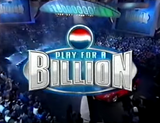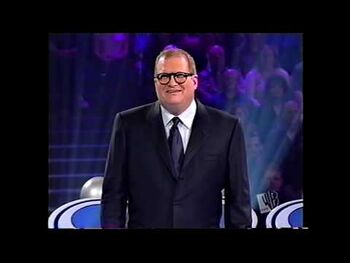| Hosts | |
| Drew Carey (2003) Damon Wayans (2004) | |
| Co-Hosts | |
| Holly Robinson-Peete & Jamie Kennedy (2003) Tom Bergeron (2004) | |
| Broadcast | |
| The WB: 9/14/2003ABC: 9/12/2004 | |
| Packager | |
| Diplomatic Productions | |
Pepsi's Play for a Billion was a special where the winners of a promotion from Pepsi would have a chance to win $1 million in cash and then play for a grand prize of $1 billion.
Gameplay (WB version)[]
Pre-game[]
While the promotion was active, people who bought specially marked Pepsi products could visit the company's website and enter a code marked on the package. One thousand entrants were chosen at random and flown to Orlando for the final contest. Prior to the broadcast, each entrant chose a unique six-digit number.
During the broadcast, a $1 billion winning number was determined backstage in a two-step process under close supervision. First, hostess Holly Robinson Peete was presented with a briefcase full of 10-sided dice; every face on any given die was marked with a different digit from 0 through 9. She selected and rolled one die at a time, and after the topmost digit of each roll was verified, a pool ball marked with that digit was dropped into a bag and the die was discarded. After Peete had rolled six dice, a chimpanzee named Mr. Moneybags blindly drew one ball at a time from the bag and the digits on those balls were recorded from left to right to set the winning number. Each ball was discarded after it was drawn. The winning number and the process of determining it were shown to the home audience, but were kept secret from everyone in the studio.
During the broadcast, host Drew Carey and co-host Jamie Kennedy chose audience members to receive or play for prizes.
Main Game[]
The 10 audience members whose numbers were closest to the winning number were invited onstage to compete in the main game. "Closest" was decided based on the following criteria, from highest priority to lowest:
- Most matching digits in the correct place.
- Most matching digits, regardless of placement.
- Mathematically closest to the winning number, high or low.
- Lowest number.
The contestants were offered a guaranteed cash prize to quit the game, and the first to hit a buzzer within a set time limit received the money. If no one buzzed in, the contestant farthest from the winning number was eliminated with no winnings. Nine rounds were played in this fashion, with the first-round prize starting at $20,000 and increasing by $10,000 per round, and the time limit increased from 10 seconds to 30 by the end of the game.
The last contestant standing after the ninth round won $1 million and control of the numbers used by the other nine in the bonus round in addition to their own.
Bonus Round[]
Out of the winner's 10 numbers, the one closest to the winning number was compared against it, one digit at a time. If the numbers matched exactly, the winner received the $1 billion grand prize; if not; they kept the $1 million.
Unwilling to bear the risk of a potential $1 billion payout, PepsiCo made arrangements with Berkshire Hathaway to insure the prize at a $10 million premium.
If won, the grand prize would have been paid as an annuity over 40 years, at $5 million per year for the first 20 years, $10 million per year for the next 19 years, and a final payment of $710 million in year 40. Alternatively, the contestant could have opted for a lump-sum payment of $250 million. The $1 million prize was paid in a lump sum.
To date, the $1 billion prize is the largest ever offered on a U.S. game show of any kind, including lottery shows and specials.
Russian Version[]
A Russian version[1]of this show aired in 2004.
Gallery[]
Set Pics (WB era)[]
Videos[]
Promos[]
Trivia[]
This is the first game show to be sponsored by the soda brand, the second is Cherries Wild hosted by Jason Biggs on FOX in 2021.







